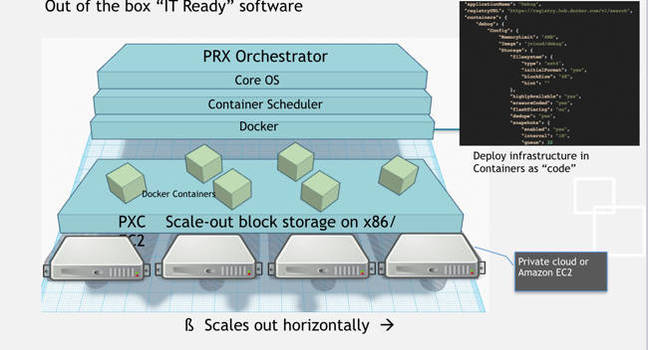This article is more than 1 year old
Docker-ed vessel Portworx takes three Ocarina folk aboard
Container-aware storage startup unveils boxy software product
Startup Portworx is providing elastic scale-out block storage natively to Docker containers, so containerised apps can execute directly on the storage infrastructure and containers persisted and scheduled fluidly across machines and clouds.
It says its PWX software product "enables the rapid deployment of stateful, distributed applications into production".
Portworx also benefits stateless container apps, with orchestration of both compute and converged storage nodes, unified framework for stateless and stateful applications. It is "out-of-the box ready for IT".
Portworx's CEO and co-founder is Murli Thirumale, who co-founded and was CEO at Ocarina Networks, which was bought by Dell for its deduplication technology in 2010. Gou Rao, CTO, is the second co-founder and was also a co-founder at Ocarina. Vinod Javaraman is the third co-founder – he is the chief architect and held that role at Ocarina, too.
The Ocarina trio's new company was founded this year and gained $8.5m in A-round funding, led by the Mayfield Fund with a contrinbution from Michael Dell. These investors think it posssible that Portworx' software could displace both SAN and NAS storage for containerised apps.
Portworx claims trad SAN and NAS storage is overkill and costly for containers.
Much like Tintri pioneered VMware virtual machine-aware and VM-centric storage with its hybrid flash/disk arrays, Portworx hopes to do the same for Docker.
It points out: "A container’s data is not inherently portable or persistent across multiple nodes, storage performance is not tuned for containers, and storage features such as snapshots and replication are not container-specific, but rather LUN-generic." Replace containers with VMs and it could be Tintri talking.
PWX provides:
- Automated storage provisioning to containers
- Container-Aware storage providing data persistence across nodes, container-level snapshots, and storage policies at container granularity
- Self-service IT
- Converged Storage ensuring containers run on storage nodes to maximise I/O performance
- Elastic Storage Orchestrator to auto-scale block storage to meet application needs and move underlying storage blocks across nodes to optimise performance and ensure high availability
In a slide deck, Portworx said:
- We provide elastic scaleout storage, network and compute for Linux containers
- We remove SAN/NAS architectures and run stateful applications directly on the storage nodes
- We handle the overall clustering and scheduling of all containerised services via a software-driven approach on commodity servers, EC2 and GCE
Running containers directly on the storage nodes suggests a cluster of servers with local storage aggregated into a virtual pool. A Portworx diagram confirms this:

PWX runs on converged nodes.
Nick Stinemates, head of business development and technical alliances at Docker, is mates with Portworx and gave out a canned quote: “Portworx' multi-host storage provisioning solution, in combination with Docker’s volume solution, enables persistent data storage across multiple Docker hosts.”
Thirumale said: “Building storage with container-level granularity ensures storage policies can be applied at the container level, enabling greater agility, application state consistency, high availability, rolling upgrades and high performance. In getting to this point, we had to break a few cherished notions about storage and traditional architectures.”
Portworx believes containers will replace VMs in the data centre and its PWX software is the industry's first Docker-native storage.
The Portworx PWX Developer Preview will be available in August 2015. To get more info and pricing or to request a demo, contact info@portworx.com. ®
